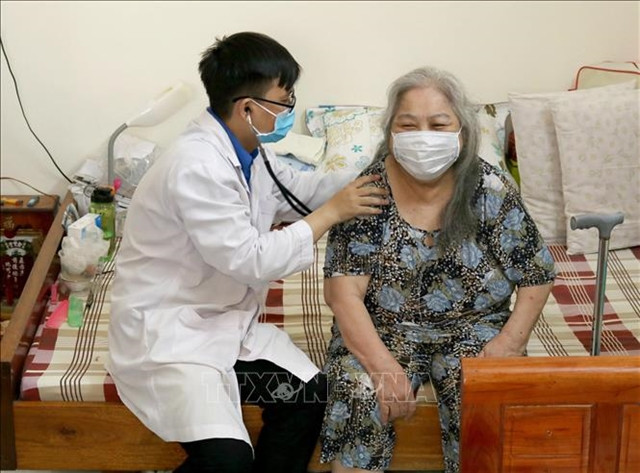 |
| A doctor at Thống Nhất Hospital in HCM City conducts a home-based health check for an elderly patient. VNA/VNS Photo |
The initiative, led by the Department of Health, also aims to effectively manage and detect non-communicable diseases (NCDs) among this population.
The plan, set to begin in 2024, has been submitted to the People’s Committee for approval and budget allocation.
As part of a pilot programme, each district will be assigned a specific ward responsible for conducting health check-ups for over one million elderly residents by August 31.
The health check-up package will include clinical examinations, abdominal ultrasounds, and various tests to determine glucose, creatinine, LDL-C, and triglyceride levels.
These screenings are crucial in identifying potential health issues and preventing the onset of chronic diseases, according to the Department of Health.
The cost for this package is over VNĐ140,000 per person, but under this programme, all expenses will be covered by the city’s budget.
Designated facilities, such as health stations, health centres, district hospitals, or regional general hospitals, will be utilised to carry out these health check-ups. These facilities must have adequate staff, necessary equipment, and coordination with local authorities to establish convenient check-up locations.
Each team conducting the check-ups will consist of a general practitioner, a specialist in general or family medicine, and a doctor skilled in abdominal ultrasound examinations, to be able to provide medical check-ups for up to 50 individuals per day.
During the check-ups, doctors will make appropriate examination and testing recommendations. Test results will be available within 24-48 hours, allowing for timely diagnoses and immediate treatment if necessary.
Elderly patients diagnosed with non-communicable diseases during these check-ups will be enrolled in an integrated programme closely linked to local health stations.
Their test results will be recorded in electronic health records, enabling individuals to better manage their personal health information and for healthcare facilities to have comprehensive data for subsequent visits, ensuring continuity of care.
For those who decline treatment at the health stations, their information will still be updated for management purposes, and they will be referred to other healthcare facilities if necessary.
The city has over four million individuals aged 60 and above. Most of them suffer from high blood pressure, diabetes, and cardiovascular diseases, according to the department.
Dr Nguyễn Văn Vĩnh Châu, the department’s deputy director, emphasised the importance of equal access to quality healthcare for all individuals.
“The initiative is a significant step towards addressing NCDs and promoting better healthcare for the elderly population.
“By providing accessible and comprehensive health services, the city aims to improve the quality of life and reduce medical costs for this vulnerable group.”
NCDs are a global concern, accounting for 41 million deaths annually, or 74 per cent of all deaths, according to the World Health Organization (WHO).
These diseases primarily affect low- and middle-income countries, including Việt Nam. Cardiovascular diseases are the leading cause of NCDs deaths, followed by cancers, chronic respiratory diseases, and diabetes.
Modifiable behaviours such as tobacco use, physical inactivity, unhealthy diet, and alcohol consumption all contribute to the risk of NCDs, as stated by WHO.
Detection, screening, treatment, and palliative care are key components of the response to NCDs, according to WHO. — VNS